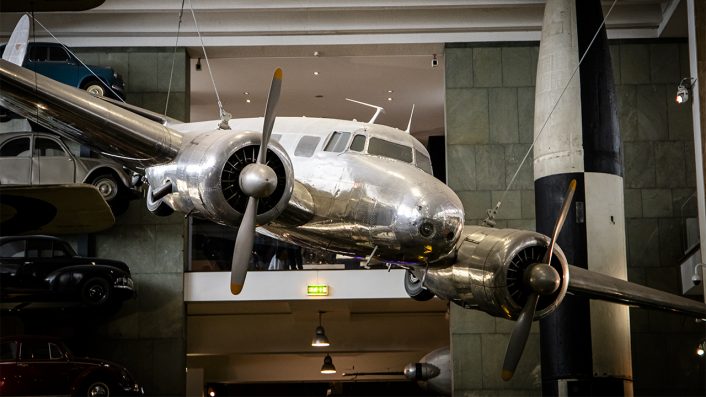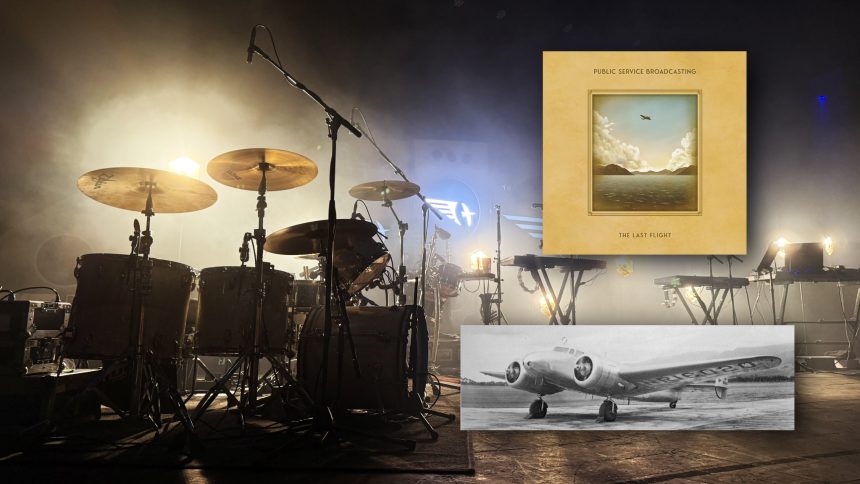Public Service Broadcasting’s The Last Flight tells Amelia Earhart’s story through her diary entries, backed by masterfully composed instrumentation, and they’re touring Europe and North America this year.
“I was always dreaming,” opens the lead track of the same name. A melancholic piece that builds to an enormous crescendo of strings as, in the background, actor Kate Graham provides a voice for Amelia Earhart’s own writings. She describes her passion for flight, her determination to take to the skies. “Everyone has oceans to fly if they have the heart to do it. Is it reckless? Maybe. But what do dreams know of boundaries?”
Public Service Broadcasting (PSB), a genre-defying British ensemble originating from London in the late 2000s, have gathered a relatively niche but loyal following over the last fifteen years. Eschewing the norm in a way that feels like a natural endeavor for this band, the group’s lead, J. Willgoose Esq., decided from the very early days that singing was “never going to work”.
Instead, working from a number of archive sources including the British Film Institute (BFI) and the UK’s National Archives, narratives were pieced together with carefully curated audio recordings from films, newsreel, and radio broadcasts to tell the stories of the Supermarine Spitfire, the first successful climb of Mt. Everest, colour television, and even the British postal service. These formed PSB’s first full album, Inform-Educate-Entertain, released in 2013 and reaching 21 in the UK’s official album chart.
Two years later, PSB released The Race for Space, a concept album with one continuous narrative following the development of spaceflight during the 1960s. Beginning with President John F. Kennedy’s famous 1962 speech in which he declares “We choose to go to the Moon in this decade and do the other things, not because they are easy, but because they are hard”, the album backtracks to 1957’s launch of Soviet satellite Sputnik before progressing through to Yuri Gagarin’s Vostok 1 and the U.S. Apollo programme.
The album has lived well beyond its initial tour, which included two special concerts at the UK’s National Space Centre in Leicester, seeing a significant revival in 2019 as commemorations of the 50th anniversary of Apollo 11’s landing on the Moon took place. PSB played the album alongside an orchestra live at the Royal Albert Hall during the world famous BBC Proms, and lead single Go! was performed live on the BBC’s Newsnight programme. On Jul. 20, 2019, the anniversary itself, PSB performed to crowds at Goonhilly Earth Station in Cornwall in the shadow of the site’s 1,118 tonne, 25.9 metre diameter satellite dish ‘Arthur’. Built in 1962, the dish was Europe’s primary downlink for the live TV feed that showed Neil Armstrong and Buzz Aldrin walk on the Moon.
Fast forward six years. The band take to the stage in Cornwall once again, playing to a crowd in Truro as part of the first tour supporting the release of The Last Flight. As many as eight performers fill the stage, featuring the band’s core three musicians, their dedicated visuals and set design artist Mr B – who uses a camera to create the video graphics displayed on the band’s cockpit-themed stage backdrop in real time during the show – as well as a three-person brass section and the incredibly talented singer and keyboardist EERA. EERA provided the live vocals for many of the songs from The Last Flight, and on the album recording itself performed on the song A Different Kind of Love.
View this post on Instagram
It is difficult to imagine ahead of time how well PSB’s work will translate to a live performance, given its reliance on inherently pre-recorded media. But you can never underestimate the musical genius of J. Willgoose Esq. and band members J F Abraham (bass guitar, keyboards, horn), and Wrigglesworth (drums). If anything, the atmospheric sounds and emotions of The Last Flight hit you even harder in person.
As an aviation enthusiast, it is hard to not feel captured by the recreated words of Amelia Earhart which resonate through the album. “The lure of flying is the lure of beauty. The dramas of the clouds. The glory of the stars. The wonders of the waters and skies,” she relates, backed by the soothing sounds of Arabian Flight – at the time of writing, the most popular song from the original album on streaming service Spotify.
Lead single Electra probably touches on the feelings of passionate aviation enthusiasts most of all. A love letter to the Lockheed Model 10 Electra, the all-metal twin engined airliner produced in the 1930s that would serve as Earhart’s steed for her attempted circumnavigation of the world in 1937. “I could write poetry about this plane,” Earhart says. “How marvelous is a machine and the mind that made it.”
The song’s quotes from Earhart are interspersed with newsreel clips: “The first all-metal surface design. The cruising speed of over two hundred miles an hour. Two five hundred fifty horsepower engines. The future of flying is the Electra” as well as callbacks to songs from PSB’s archive: “Wings, body, tail, all in one” from Spitfire, as well as “It is the perfect meeting of men and machine. The machines will do the heavy work. As men will supervise the machines” from Progress (featured on 2017’s Every Valley) and Der Rythmus der Maschinen (from Bright Magic, 2021).
When I visited London’s Science Museum earlier this year, where a Lockheed Electra hangs prominently in the museum’s Modern World gallery, these clips and these songs resonated in my mind as I looked up at the sleek, silver design. Somehow still futuristic, even 90 years after its first flight, and yet by today’s standards remarkably crude. The aircraft’s distinctive double tail was the brainchild of Kelly Johnson, later the famed team leader of Lockheed Skunk Works, contributing significantly to the designs of the U-2 Dragon Lady and SR-71 Blackbird, among other aviation icons.

The pure joy Earhart got from flying is told by the equally joyful and upbeat The Fun of It. Flying in contrast to the notion that becoming a pilot was simply a job – and indeed, in contrast to the idea that there needs to be a productive end goal to any pursuit – the song combines Earhart’s writings with contemporary vocals performed by Andreya Casablanca. “Wherever I am in the world people always ask me ‘Why do you do it, why risk your life?’ My answer is always the same. I do it because I want to. I do it for the fun of it”
Casablanca follows with the equally moving “I want to feel it. To know the limits. In every moment, in every minute.”
The song additionally tackles the sexism of early aviation. Earhart was far from the first female aviator, but she is probably the most famous of them all. Her record-breaking solo transatlantic flight in 1932 was the first by a woman, and earned her the U.S. Distinguished Flying Cross. Society then still had many who said it wasn’t a woman’s place to fly a plane. Some similar attitudes, unfortunately, still prevail to this day. “Girls don’t, girls can’t. Binaries I don’t understand. It’s how I understand. Life on earth, up in thе sky. I want to feel alive, I want to feel alive.”
J. Willgoose Esq. noted this aspect of the album in interviews, telling MusicRadar “I had my antenna out for an interesting story based on a woman or women because most of the archive we have is overwhelmingly male-dominated – as is 20th century history.”
The heaviest track on the album, musically speaking, follows Earhart’s troubles as she attempted to fly through perilous weather conditions in East Asia. Monsoons has heavy, foreboding guitars that really do impart a sense of panic upon the listener as quotes from Earhart are played in the background. “Still no good. We can’t go through it, we’ll have to fly up and over it. I’ve never seen anything like it.”
The Last Flight‘s penultimate track, A Different Kind of Love is a mellow and wistful song led by EERA’s vocals throughout. Opened by a recreation of Earhart speaking to husband George P. Putnam while she was away on her circumnavigation attempt, knowing what we as listeners know of Earhart’s fate adds a heart-wrenching level of foreshadowing. “Well, I’ll see you soon enough. Then we can take a trip together sometime. And you can fly me to all the different corners of the globe,” she tells Putnam, not knowing she’d never be able to see her promise through.
We still don’t know the full story of what happened to Amelia Earhart and her navigator, Fred Noonan. The duo went missing on Jul. 2, 1937, while en route to Howland Island, 1,700 nautical miles from Hawaii. It was concluded by the U.S. Government that Earhart’s plane ran out of fuel and crashed into the Pacific Ocean, where even after over 80 years of searching it’s still very possible the remains of her, Noonan, and the Electra still lie. Other theories have them stranded on a Pacific island, or even captured in secret by Japanese forces.
As such, the ending of The Last Flight heads away from the specific and primarily relies on strings to evoke feelings of tragedy. Earhart speaks in the background, but is barely audible through most of the song. Howland is itself over eight minutes long, with six and a half minutes of string eventually leading into silence. The album ends with the sounds of nature – birds, wind, waves, all taken from a recording made at Howland Island.
Night Flight, released on Oct. 10, 2025, re-imagines each of the tracks, some by J. Willgoose Esq. himself and others by contributors including EERA, Gus Unger-Hamilton from alt-J, and British post-punk duo The KVB. After its release, PSB are heading back on the road, beginning on Nov. 1 with sold-out shows at The Barbican in London before moving on to continental Europe and finishing in December with dates in North America. You can find more details on the tour, and get tickets here.









